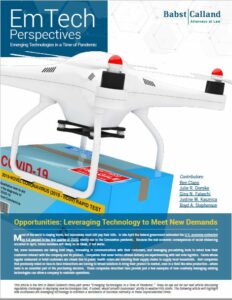
Opportunities: Leveraging Technology to Meet New Demands
Most of the world is staying home, but businesses must still pay their bills. In late April the federal government estimated the U.S. economy contracted by 4.8 percent in the first quarter of 2020, mostly due to the Coronavirus pandemic. Because the real economic consequences of social distancing occurred in April, future numbers will likely be as bleak, if not worse.
Yet, some businesses are taking bold steps, innovating in communications with their customers, and leveraging pre-existing tools to retool how their customers interact with the company and its product. Companies that never before offered delivery are experimenting with last mile logistics. Farms whose regular restaurant or hotel customers are closed due to public health orders are retooling their supply chains to supply local households. And companies that previously relied on face-to-face interactions are turning to virtual solutions to bring their product to market, even in a field like wine production—where taste is an essential part of the purchasing decision. These companies described here provide just a few examples of how creatively leveraging existing technologies can allow a company to maintain operations.
Read More.
Tags: Commercial,
Coronavirus,
Corporate Law,
COVID-19,
Drones,
Efficiency,
Emerging,
Emerging Technology,
Industry News,
Innovation,
Last Mile Logistics,
Logistics,
Mobility,
Pandemic,
Regulations,
Regulatory,
Remote Learning,
Robotics,
Robots,
Supply Chain,
Tech Industry,
Technology,
Transportation,
US DOT
The trucking industry is still adjusting to the final transition to electronic logging devices (ELDs). Some relief may be on the horizon, however, as federal regulators consider whether to relax the hours of service requirements.
“Every solution has unintended consequences, and that is exactly what we are seeing now,” says Boyd A. Stephenson, associate at Babst Calland. “The supply chain is like a balloon, where everything is interconnected. You push on one part and another piece will pop out.”
Paper logbooks are left to the discretion of the driver, while ELDs record driving time automatically to ensure driving hours are strictly followed. The idea is to make the roads safer. Effective now, strict enforcement of the ELD mandate applies to all drivers, unless they operate under the short-haul rule exemption.
The trucking industry is dealing with rising transportation costs and an overall driver shortage in an economic expansion. Freight volumes also grew more slowly in 2019, with trade conflicts and tariff increases taking a toll on growth.
An American Transportation Research Institute survey found that the top industry concerns for 2019 were driver shortages, hours of service, driver compensation and detention or delays at customer facilities. These obstacles increase trucking costs, which get passed on to shippers that need their goods transported.
Smart Business spoke with Stephenson about hours of service rules and other industry changes that businesses should be aware of in 2020.
Read More.
